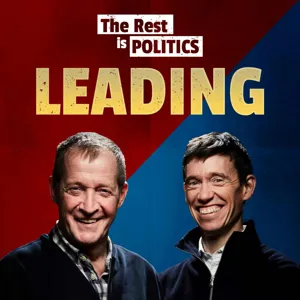Podcast Summary
Americans shifting perspective on COVID-19 as endemic disease: A recent NYT poll shows growing acceptance of COVID-19 as endemic, decreased fear for vaccinated, and importance of vaccination in shaping attitudes.
According to a recent New York Times poll, Americans may be reaching a turning point in their attitudes towards the COVID-19 pandemic. With the highly contagious Omicron variant leading to increased cases and milder symptoms for the vaccinated population, many people are rethinking their approach to the virus. The poll revealed that a significant number of Americans are growing more accepting of COVID-19 as an endemic disease, similar to the flu. This shift in perspective is reflected in their decreased fear of getting sick and their views on government response. The poll also highlighted the importance of vaccination in shaping people's attitudes towards the pandemic. Overall, the data suggests that the country may be ready to move towards a new conversation about living with COVID-19.
Americans' attitudes towards COVID risk show surprising similarities despite differences in actual risk: Older adults and younger adults express similar levels of worry about COVID, but older adults face much higher risk of death from COVID. Political ideology influences COVID attitudes and may delay a definitive pivot in the pandemic.
Key takeaway from the national poll conducted by Morning Consult is that despite significant differences in COVID risk based on age, vaccination status, and other factors, Americans' attitudes towards the pandemic show surprising similarities. For instance, older adults (17% of those aged 65 and above) and younger adults (23% of those aged 18 to 34) expressed similar levels of worry about getting sick from COVID. However, the scientific data shows that the risk is much higher for older adults, who account for 75% of all COVID-related deaths in the US. This disparity between perceived and actual risk can be partly explained by political ideology, which influences COVID attitudes across various demographic groups. The poll findings suggest that we may still be many months away from a definitive pivot in the pandemic, as Americans' attitudes towards COVID risk continue to diverge from the objective reality.
Political beliefs influence COVID-19 risk perception more than age or economic status: Older Republicans are less worried about getting sick than younger Democrats, despite similar risk assessments. Boosted individuals express high concern, while unvaccinated remain unconcerned, driven by political beliefs.
Political beliefs, not factors like age or economic status, are driving the vastly different attitudes towards COVID-19 risks among Americans. Older Republicans are significantly less worried about getting sick than younger Democrats, despite similar assessments of personal risk by age. This politically infused irrationality is also evident in polling around vaccine status. The more protected individuals are through vaccination and boosters, the more concerned they are about their own risk, with the unvaccinated expressing the least worry. Despite the low risk for most boosted individuals during the omicron wave, boosted Americans continue to express high levels of concern, while unvaccinated individuals remain unconcerned in many cases. This disconnect between risk perception and actual risk highlights the powerful influence of political beliefs on individual attitudes towards the pandemic.
Perception vs. Reality of COVID-19 Risk for Vaccinated Individuals: Despite lower COVID-19 risk for boosted individuals compared to common illnesses, fear and political beliefs influence perception, leading to unnecessary fear and restrictions.
Despite scientific data suggesting that the risk of COVID-19 is lower for boosted individuals compared to other common illnesses like the flu, many boosted people continue to live in fear and focus primarily on the COVID-19 risk. On the other hand, unvaccinated individuals often dismiss the risk altogether. This significant gap between perception and reality is influenced by political beliefs. The polling data also reveals a stark divide in vaccination rates between Democrats and Republicans, leading to a dominant role of partisanship in how people approach the pandemic. Even those who have been vaccinated may not fully trust the science and feel unprotected, leading to unnecessary fear and restrictions in their daily lives. It's important to remember that the science supports the effectiveness of vaccines in preventing serious illness, and for vaccinated individuals, the risk of omicron is similar to other common respiratory illnesses. It's crucial to trust the science and live accordingly, while also considering the vaccination status and risk levels of those around us.
Considering the Costs of COVID Precautions: As COVID evolves, debates continue on the necessity of pandemic precautions, with concerns over their impact on education, mental health, and crime weighed against their lifesaving benefits.
As COVID begins to resemble a regular respiratory virus, it's important to consider if the costs of pandemic precautions outweigh the benefits. The steps taken to minimize its spread saved lives but had significant costs, including increased violent crime, mental health issues, and drug overdoses. There's bipartisan agreement that changes to schools are damaging, but Democrats and Republicans have different solutions. Democrats, despite expressing concerns about remote learning's impact on education, socialization, and children's mental health, also support transitioning schools online to reduce omicron's spread. However, Republicans argue for keeping schools open, questioning the scientific evidence justifying school closures, especially given the mild effects of COVID on children and the availability of vaccines.
Political Divide Hinders Progress Against COVID-19: The political divide over COVID-19 hinders the country's progress, requiring a focus on increasing vaccinations and finding common ground for moving forward.
The political divide in the United States regarding the COVID-19 pandemic is a significant obstacle to the country moving past it. The strength of political identities has led to different approaches, with Republicans downplaying the virus and Democrats taking it seriously. This divide has gone beyond the realm of science, making it challenging for the country to pivot together. However, there is agreement among Americans that the country will eventually move beyond COVID. To make this a reality, increasing the number of vaccinated Americans, particularly unvaccinated Republicans, is crucial. For Democrats, accepting a small risk and learning to manage the virus instead of shutting down completely could also help in moving forward.
Balancing the risks and costs of COVID and lockdowns: Democrats consider potential harm of COVID vs damage of lockdowns, some governors relax approach, Biden admin addresses energy supply fears
The debate around reopening offices and returning to normal life amidst the ongoing COVID-19 pandemic is a complex issue that requires balancing the risks and costs of the virus with the disruptions caused by precautions. Democrats, who have been more cautious in reopening, are weighing the potential harm of COVID against the damage done by lockdowns and disruptions to children, vulnerable communities, and mental health. Some Democratic governors are starting to shift towards a more relaxed approach, while the Biden administration is working to alleviate fears of energy supply disruptions from Russia. Ultimately, the question is how to strike a balance between the ongoing risks and costs of COVID and the costs of disrupting life in response to the virus.



